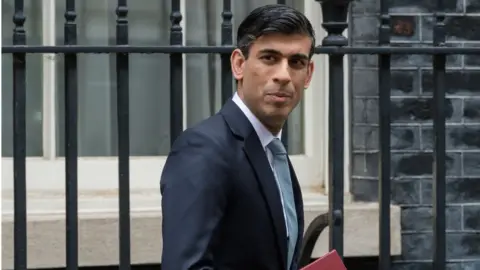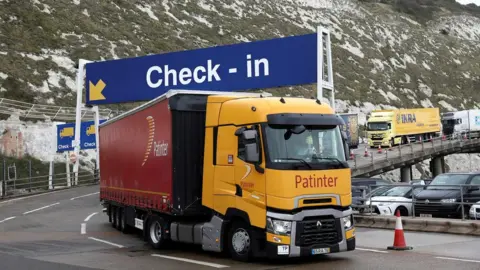Will there be a further Brexit breach of the law?

 Getty Images
Getty ImagesAs early as Thursday, I'm told, the Treasury is planning to announce it is to bring a Taxation Bill to the Commons next week that might need to contain clauses breaking international law, specifically the Northern Ireland Protocol of the Withdrawal Agreement.
This part of the agreement struck by Prime Minister Boris Johnson last year is designed to enable Brexit to occur without the need for border checks on the island of Ireland.
Under the terms of the deal many of these customs and regulatory formalities would take place, instead, on goods travelling between Great Britain and Northern Ireland.
The new bill will contain legislation required for customs and VAT for the UK's new position outside of the European Union (EU) single market and customs union.
In particular, if a deal has not been done, it will override some elements of the existing deal between the UK and the EU.
In an echo of the controversy over the Internal Market Bill, the Taxation Bill will contain "notwithstanding" clauses that provide the power to disarm the effect of certain parts of the Withdrawal Deal.
The specific issue here would be a failure of the Joint Committee (of the UK and EU) to have agreed which goods crossing the Irish Sea from Great Britain to Northern Ireland are deemed "at risk" of being exported to the EU via Northern Ireland.
The UK and EU agreed that a certain amount of checks would occur within the UK in the Irish Sea, but only on those goods meant for actual export into the Republic.
As this is impossible to establish in advance, the two parties have been trying to define which goods are most "at risk" of export.
In a no-deal situation, tariffs, taxes on trade, would apply, and the government wants to take unilateral action to determine to which goods this should apply.
Industry sources have been told to expect guidance on Friday for a possible six month unilateral easing of the requirement for new customs declarations on Great British and Northern Ireland trade.
Such "sea border" declarations are designed to capture GB to Republic of Ireland trade, without the need for any land border in Ireland.
Retailers have in recent weeks expressed concerns about the preparedness of customs and regulatory systems required to enact the new protocol, and Sainsbury's and Marks and Spencer have suggested they would be unable to supply a complete normal range of products to Northern Ireland supermarkets.
 Reuters
ReutersSome hauliers in Northern Ireland have reported a reduction in bookings from supermarkets for January.
In private meetings with government some have expressed their concern at legal liability under UK and EU law, under the terms of the Withdrawal Treaty, and have asked to see the Attorney General's legal advice.
The original decision to overwrite elements of the Withdrawal Deal with the related Internal Markets Bill sparked international concern.
This issue concerns the potentially more contentious trade in goods from Great Britain to Northern Ireland, rather than the other way around.
President-elect Joe Biden in particular, ahead of the US election, circulated a Congressional letter which urged the PM to "abandon any and all legally questionable and unfair efforts to flout the Northern Ireland protocol of the Withdrawal Agreement".
Number 10's position is that such moves guaranteed the parts of the agreement related to "unfettered access" to and from Northern Ireland for the rest of the UK.
When I asked the Chancellor last month directly about whether the Treasury was planning legislation that broke international law he said: "With regard to Northern Ireland our priority remains to protect the Good Friday Agreement [and] make sure that we can have the free flow of trade within our United Kingdom.
"The measures that we've put in place are a safety net to ensure that to make sure that if there wasn't good faith or cooperation from our partners, we'll be able to act to do that, but they are there as a safety net and insurance and [we] very much hope that they're not necessary".
Some legislation will be required with or without a deal, and the current plan is that it will not be a formal Finance Bill. But it is expected to bypass the House of Lords legislative process, as a "money bill".
Hopes are still high about a deal next week, which would make much of this issue moot.
The moves are more about a very tight legislative timetable than an attempt to have an impact on the ongoing trade negotiations. However, time really is now running out.
